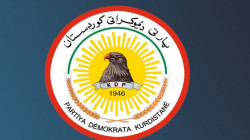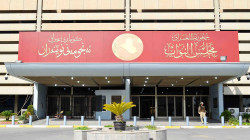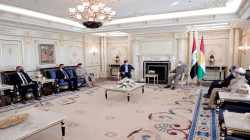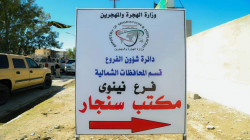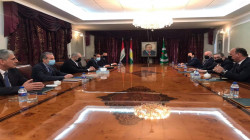KDP accuses Iraqi Supreme Court of constitutional violations and threats to federalism
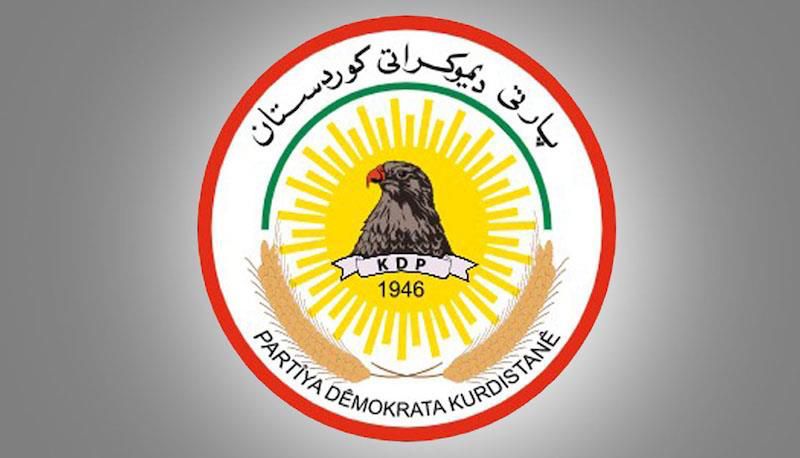
Shafaq News/ On Tuesday, the Kurdistan Democratic Party (KDP) accused the Iraqi Federal Supreme Court of violating the constitutional rights of the Kurdistan Region and the principles of federalism.
Last February, the Federal Supreme Court resolved an internal Kurdish dispute over the election law in the Kurdistan Region of Iraq concerning two crucial points. The first relates to a provision concerning the quotas for components, where the court canceled 11 seats allocated to them under the Kurdistan Parliament Elections Law out of a total of 111 seats.
As for the second point, the court decided to conduct elections in four districts instead of a single district, as stipulated in the previous law. This dispute between the two main parties, the Kurdistan Democratic Party and the Patriotic Union of Kurdistan, had caused a delay in holding parliamentary elections in the Region for more than two years.
KDP's political bureau said in a statement that the decision came "after more than eight months of sessions of the Federal Court and intentional delays without legal or constitutional justification in resolving the case raised against the amended Parliamentary Elections Law in Kurdistan No. 1 of 1991."
"We believe it is important to clarify the injustice of this decision and inform the people of Kurdistan, through this statement, of the unfair and unjust aspects of the court's decision."
The KDP statement addressed the people of Kurdistan, stating that "the struggle of the Kurdish people over a century has been for rejecting dictatorship, rising against the injustices of successive governments, achieving freedom, and obtaining their legitimate political and democratic rights according to international treaties and conventions. It highlighted the uprising against dictatorship in 1991, leading to the liberation of a wide area of Kurdistan's land and establishing a political entity with legislative, executive, and judicial authorities."
The statement further explained that "after the fall of the dictatorial regime in 2003, the Constitution of Iraq in 2005 was established, reflecting the sacrifices of the Iraqi people and embodying their goals of freedom and democracy. It aimed to establish a federal republic that safeguards the rights and dignity of its components, dealing with them based on equality and active participation at all levels of governance and administration. The composition and authorities of the Kurdistan Region were reflected in the constitution, gaining popular consensus with an 80% approval rate in the referendum."
"wWhat cannot be overlooked is the continuous disregard, and even violation, of the provisions and stipulations of the constitution by some federal agencies."
Moreover, the KDP statement pointed out that the Court "should safeguard the constitution's sovereignty and preserve the power distribution system and authorities according to its provisions."
The statement pointed out that the recent decisions of the Supreme Federal Court aimed to "diminish the authorities and powers of the regional government explicitly. It has clearly sought to weaken its institutions and pave the way for federal authorities to surpass the constitutional powers of the Region."
Furthermore, the statement added that the Supreme Federal Court's reduction of the number of seats in the Kurdish Parliament, cancellation of seats allocated to components, and division of the Region into electoral districts without constitutional justification is a "blatant violation of fundamental constitutional principles."
"The Kurdistan Parliament Election Law has been in effect for over 30 years, overseeing five electoral cycles, becoming the cornerstone of democracy and fair representation of all components, perspectives, and opinions within the Region. This law showcased the Region as a center for democracy and coexistence between the Region and the world."
The statement concluded that the decision "failed to prove the unconstitutionality of the single electoral district system used in the Region. Instead, it acknowledged the positive and strong aspects of both the single and multiple electoral district systems. The court's assertion did not reach the point of declaring the unconstitutionality of the single electoral district system."
Furthermore, the statement asserts that the cancellation of component quotas in the Region contradicts the Federal Parliament and Provincial Council's Elections Law provisions, which allocate seats for components.
"This action also conflicts with Articles 49/f1 and 125 of the constitution, both of which emphasize representing all components of the people in the parliament. They guarantee the rights of minorities (such as Turkmen, Chaldeans, Assyrians, Armenians, and other components) to exercise their legitimate rights, including political rights, by ensuring their representation in elected councils."
The Party affirms these decisions "have complicated and strained relations between federal and regional authorities."
The statement clearly reveals Iraq's "inclination towards a centralized state, moving away from the federal democratic system. This necessitates all partners in governance, especially within the State Administration Alliance, to work diligently to ensure compliance with the constitution's provisions and the terms of the State Administration Alliance agreement."
